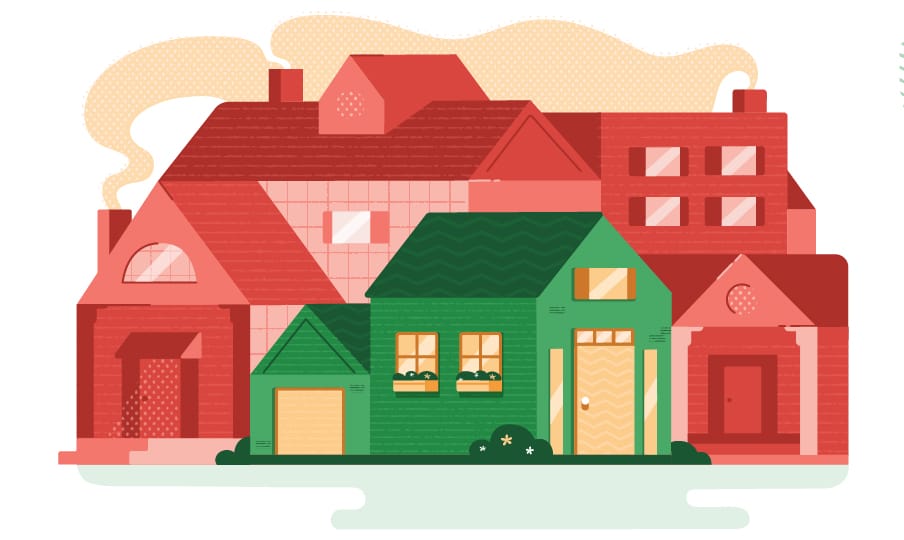NOTICE: Internet Explorer was retired by Microsoft on June 15th, 2022 and is no longer supported. This could change how you access Online Banking.
Our banking centers close at 12pm on 12/24 through Christmas Day. Transactions scheduled at that time will be processed the next business day.
How Much House Can I Afford?

Buying a home is a defining life moment. It’s also one of the largest investments you can make. Whether it’s your first home, next home or second home there’s quite a bit to consider. Sure, it’s fun to surf the internet and gather inspiration on Pinterest, but you’ll need to snap back into reality and make sure you make the right decision. How much house you can afford depends on a lot more than what your bank will loan you. So, let’s get started by determining those factors and setting a mortgage budget. You can also check out our mortgage calculator below, which will help you determine how much your home will actually cost you.
Setting a Mortgage Budget
How much should you spend on a house? Start by setting a budget. When setting a mortgage budget, there’s two factors you’ll need to consider: How much house you can afford in actuality and how much your lender thinks you can afford. The personal criteria are just as important, if not more, than the latter. Just because you’re pre-qualified for a million-dollar beachfront condo doesn’t mean you should take out that loan. Let’s take a deeper dive into the personal criteria you should look at before signing off on a mortgage.
How Much Should You Spend on a House Based on Personal Criteria?
- Income: Your income is the cornerstone of your mortgage budget. Are you living on one income or two? Are you living comfortably with a set budget and have a decent savings built up? You will definitely need a healthy savings, both primary and emergency, before purchasing a home. If you’re living paycheck to paycheck, it may not be the time to close on a mortgage loan. You also want to think about your employment situation. How secure is your job? If you’re comfortable with your income and where you see it going in the future, that’s a great sign and the first hurdle to mortgage pre-qualification.
- Expenses: This is also the time to take a look at your expenses in relationship to your income. This includes all debt and everyday expenses—those that are critical like utilities and food as well as other expenses like monthly subscriptions. Make sure you also include any future expenses you anticipate like a new car, vacations and even children.
- Lifestyle: Purchasing a home is definitely a change of lifestyle. When you’re getting ready to buy a home, you’ll need to save money for a down payment, other costs and fees. So, if you’re set on purchasing a home, it’s time to cut back on non-critical expenses and make adjustments to your spending habits.
- Home Ownership Costs: This is also the time to think beyond your future mortgage payment. Home ownership comes with a number of additional costs and usually the larger the home, the bigger the cost. Think maintenance—inside and outside, landscaping, utilities and homeowners association fees. Are you purchasing a fixer-upper that needs work right away? Furniture and décor are also something to take into consideration.
How a Lender will Decide How Much House You Can Afford
While you’re working on your personal criteria for affording a home, your lender will take a different perspective. Lenders will break down your eligibility into a formula based on four key areas:
- Income
- Debt
- Assets
- Liabilities
They will also look at your debt-to-income ratio. This ratio compares your total monthly debts to your monthly pre-tax income. For mortgage pre-qualification, the lower the ratio the better.
Lenders generally use the 28/36 rule, however there could be some flexibility based on product type. This rule measures your ability to afford a mortgage based on gross monthly income, monthly house-related payments and other monthly debt payments.
- The 28 represents your front-end ratio. That means 28% of your gross monthly income should be used on housing expenses like monthly principal, interest, property taxes and insurance payments. If you have a condo or home ownership association fee, that will also be included in the 28%.
- The 36 represents your back-end ratio. This is calculated by dividing all recurring monthly payments and debt by your gross monthly income. The back-end ratio includes everything in the front-end ratio and your other debt like credit cards, auto loans, student loans and any other personal loans. If you qualify for a mortgage pre-qualification under the 28/36 rule, you shouldn’t have trouble repaying your loan. However, if you stretch this rule too much, it may be hard to repay your loan and you may want to take a more conservative approach to home ownership.
Your credit score is also part of the lender’s formula. This represents the risk that a lender is taking on if they grant you a mortgage. Applicants with lower credit scores may be approved, but with a higher interest rate. So, if you’re getting ready to purchase a home, start working on your credit score immediately. You’ll also want to avoid any hard credit checks that result from purchasing a car or signing up for a new credit card.
The Mortgage Budget Bottom Line
There’s quite a lot to consider when making one the largest investments you’ll ever make. The more you know about how to set a mortgage budget, the better. Before making the decision about how much house you can afford, it’s critical to do the math and start saving for your dream home.
Once you’ve made the decision to move forward with a mortgage pre-qualification, be sure to choose a lender with credible history of competitive rates and loan options. You also want to work with a lender that will guide you through every step of the process. WesBanco’s loan officers take a hands-on approach and make the journey easy.
Explore WesBanco’s mortgage options and our diverse solutions to navigate the home-buying process.
Learn More about WesBanco’s Mortgage Options:
Content is for informational purposes only and is not intended to provide legal or financial advice. The views and opinions expressed do not necessarily represent the views and opinions of WesBanco.



